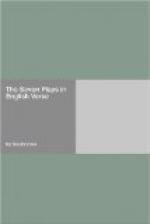CH. Aias, I would thy heart were touched like
mine
With pity; then her words would win thy praise.
AI. My praise she shall not miss, if she perform
My bidding with firm heart, and fail not here.
TEC. Dear Aias, I will fail in nought thou bidst me.
AI. Bring me my boy, that I may see his face.
TEC. Oh, in my terror I conveyed him hence!
AI. Clear of this mischief, mean’st thou? or for what?
TEC. Lest he might run to thee, poor child, and die.
AI. That issue had been worthy of my fate!
TEC. But I kept watch to fence his life from harm.
AI. ’Twas wisely done. I praise thy foresight there.
TEC. Well, since ’tis so, how can I help thee now?
AI. Give me to speak to him and see him near.
TEC. He stands close by with servants tending him.
AI. Then why doth he not come, but still delay?
TEC. Thy father calls thee, child. Come,
lead him hither,
Whichever of you holds him by the hand.
AI. Moves he? or do thine accents idly fall?
TEC. See, where thy people bring him to thine eye.
AI. Lift him to me: lift him! He will
not fear
At sight of this fresh havoc of the sword,
If rightly he be fathered of my blood.
Like some young colt he must be trained and taught
To run fierce courses with his warrior sire.
Be luckier than thy father, boy! but else
Be like him, and thy life will not be low.
One thing even now I envy thee, that none
Of all this misery pierces to thy mind.
For life is sweetest in the void of sense,
Ere thou know joy or sorrow. But when this
Hath found thee, make thy father’s enemies
Feel the great parent in the valiant child.
Meantime grow on in tender youthfulness,
Nursed by light breezes, gladdening this thy mother.
No Greek shall trample thee with brutal harm,
That I know well, though I shall not be near—
So stout a warder to protect thy life
I leave in Teucer. He’ll not fail, though
now
He follow far the chase upon his foes.
My trusty warriors, people of the sea,
Be this your charge, no less,—and bear
to him
My clear commandment, that he take this boy
Home to my fatherland, and make him known
To Telamon, and Eriboea too,
My mother. Let him tend them in their age.
And, for mine armour, let not that be made
The award of Grecian umpires or of him
Who ruined me. But thou, named of the shield[3],
Eurysakes, hold mine, the unpierceable
Seven-hided buckler, and by the well stitched thong
Grasp firm and wield it mightily.—The rest
Shall lie where I am buried.—Take him now,
Quickly, and close the door. No tears! What!
weep
Before the tent? How women crave for pity!
Make fast, I say. No wise physician dreams
With droning charms to salve a desperate sore.




